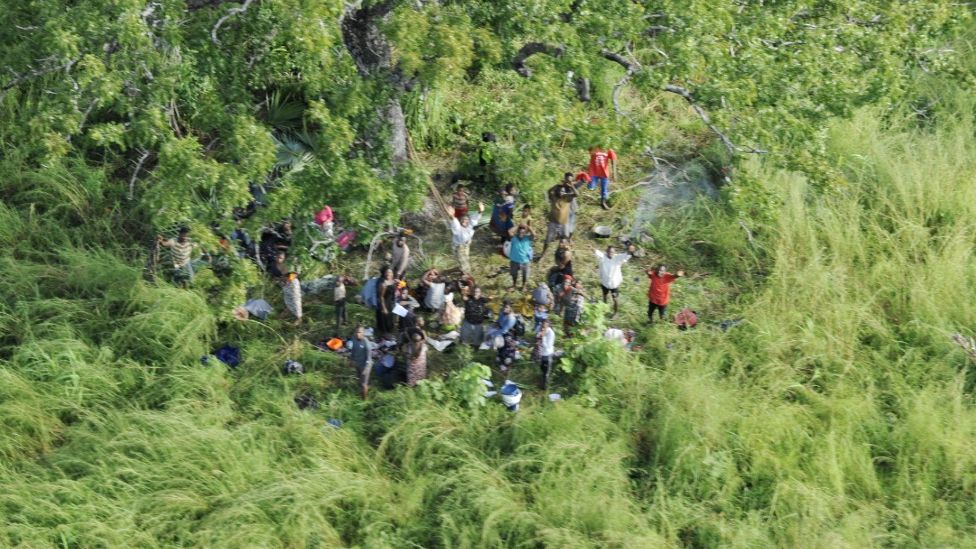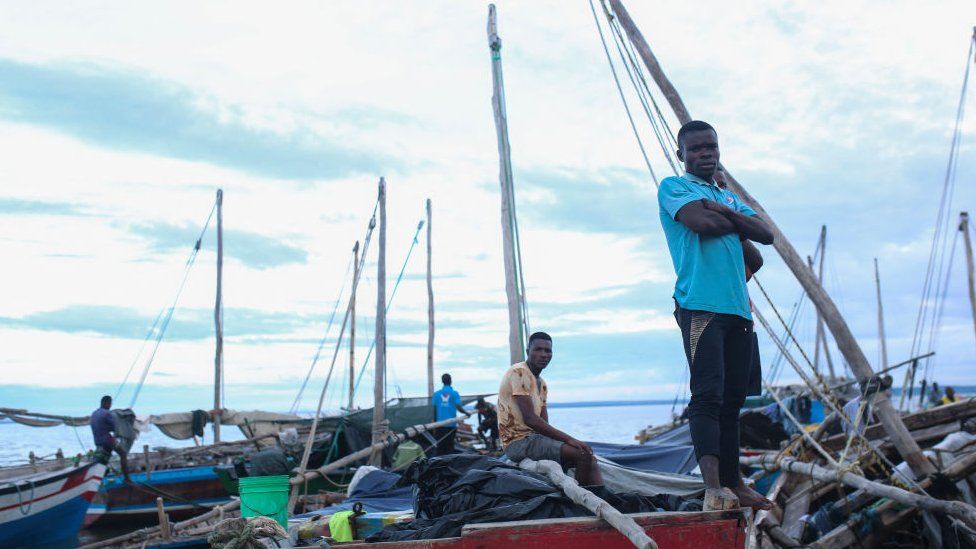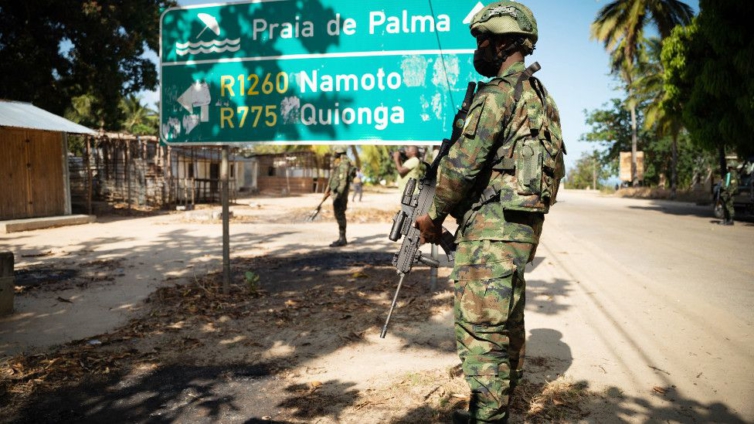The town of Palma in northern Mozambique was the scene of a horrific attack by Islamist militants a year ago, which left dozens of people dead, forced thousands to flee their homes and put a massive nearby gas project on hold.
BBC Africa correspondent Catherine Byaruhanga has been speaking to some of those who survived the assault to see what has changed.
Fear still pervades Palma.
Before the well co-ordinated assault began, the coastal town was packed and bustling - full of those who had come to find work in the area's burgeoning gas industry.
It was also full of thousands of people who had fled violence in other areas of Cabo Delgado, the mainly Muslim province where an Islamist insurgency began in 2017.
The militants are known locally as al-Shabab. They have no link to the Somali group of that name, but have since pledged allegiance to the Islamic State (IS) group.
Today, French energy giant Total's multi-billion-dollar gas project remains closed.
Some of those who have begun to return home are too afraid to talk to the BBC over the phone, even though the militants have been expelled.
Antònio, one of the contractors who had gone to the town to work in the gas industry, is not hopeful about the future.

Despite the deployment of regional troops to fight al-Shabab, the 36-year-old, whose name has been changed to protect his identity, says he can't see himself returning.
"I don't think myself that I can go back there," he told me over Zoom from his home in southern Mozambique, where he is still struggling to find a job.
He remains traumatised by the events that, four days into the siege that began on 24 March, saw the militants break through the gate of his work compound where he, his brother and other contractors - some from Zimbabwe and South Africa - were hiding in pre-fabricated buildings.
"I heard the gun shooting. [Shouts of] 'Allahu Akbar! Allahu Akbar!' And then when I opened my curtains, I saw one guy standing by the main gate. They were wearing green clothes with a red cloth on their head."
The fighters could not open the door to his room but 16 men, including his brother and three cousins who had locked themselves into a safe room, were discovered.
"They started screaming: 'Oh we found people, we found people, come, come!'" he remembers.
Nine militants then marched the men out into the bush and beheaded them.
Antònio, who was eventually rescued by helicopter from the compound by private security firm Dyck Advisory Group, says the bodies of his brother and cousins have never been found or returned to the family.
"Al-Shabab are ghosts, there is no stopping them," he says.
This sentiment sums up the difficult nature of tackling militants who are able to melt into the local community and countryside.
Insurgency continues
The terror waged in Palma did put pressure on Mozambique to accept foreign assistance. Last July, about 2,000 troops from Rwanda and 1,000 soldiers from various southern African countries arrived in Cabo Delgado.
Over several weeks, they rooted out al-Shabab fighters from many of their strongholds.

But that has just meant the jihadists have moved to the thick jungles and neighbouring regions, from where they stage smaller hit-and-run attacks.
"It's changed the nature of the insurgency - it's changed the nature of the war, but the war continues," says Eric Morier-Genoud, a Mozambique analyst and reader in African history at Queen's University, Belfast.
Wesley Nel, who is South African and among several foreigners caught up at the siege at Palma's upmarket Amarula Hotel resort, agrees.
In a desperate attempt to flee, he and about 100 others made a dash in cars from the hotel towards the ocean. But the militants were waiting and his brother Adrian was killed in the ambush.
"Every day I recall that moment of the convoy, trying to escape and my brother getting shot… [what] is difficult is still seeing that it's happening.
"Every two or three days, the insurgents are attacking. This is not over. It seems like nobody cares. If you're in Africa, nobody cares."
It was the plight of those caught up in the hotel - white foreigners pleading for help to be rescued - that really caught the attention of the world's media.
Veteran Ugandan journalist Charles Onyango-Obbo, who recently visited Palma, says life there is slowly returning to normal, though many buildings still lie in ruins.
The Amarula is one of those that has been extensively repaired; the hotel has partially reopened and hopes to be fully up and running soon, he says in his piece for The East African newspaper.
Is this an indication that Total will return?
The Rwandan forces have secured Palma as well as the strategic port town of Mocímboa da Praia, which has an airport and harbour necessary for Total's gas projects on the nearby Afungi peninsular.
Ukraine a game-changer
Total's Mozambique manager, Maxime Rabilloud, recently visited. But given what happened last year - and the backlash Total faced for not doing more to help rescue people during the attack - the company is being cautious.

"Everything will depend on the re-establishment and sustainability of security," Total told the BBC.
Nearly 770,000 people have been displaced by fighting in the region and the government is still discouraging them from returning to areas that have been liberated, as it does not think they are safe enough.
Dr Morier-Genoud notes that Mr Rabilloud was careful to say it was not enough just to secure the area where the gas facilities were being built - the whole district needed to be safe.
But he says the conflict in Ukraine could be a game-changer for Mozambique, as there is now a huge demand for liquefied natural gas (LNG), which may push Total to make big efforts to restart the project.
"I would not be surprised if we get more international troops in - [and] more means for that," he says.
"If it is the aim to stave off Europe from Russian gas, then all LNG gas will be necessary, and that means the project in northern Mozambique, which is massive."
Latest Stories
-
Dr. Ekua Ekumah highlights how to cultivate new theatre audience
6 mins -
Zambian FA president charged with money laundering
24 mins -
Mysstel releases video for ‘Paradise’
27 mins -
We are yet to receive an apology from Ashanti Regional Minister – ECG
29 mins -
UEFA International Tournament: Ernest Ofori scores for Black Starlets in defeat to Russia
36 mins -
Cocoa price surge linked to production decline -COCOBOD CEO
41 mins -
Atarah Praise returns on May 19 at Adenta Barrier
42 mins -
World Robotics Championship: 18 pre-tertiary students poised to win medals for Ghana at global competition
47 mins -
Drowned widow was scammed out of $1.5m on dating app hoax, left note about secret ‘double life’
1 hour -
ECG workers threaten to disconnect power from Ashanti Regional Minister’s home
1 hour -
Brain tumour shatters 20-year-old’s dream of becoming a doctor
1 hour -
ICDP Ghana introduces portable ultrasound machines in rural communities
2 hours -
Seven killed in sleep after Ethiopia building collapses
2 hours -
Benjamin Nii Ayi Lartey appointed Head of Legal & Company Secretary at UBA Ghana
2 hours -
Fitch affirms ETI at B-; Outlook stable
3 hours

